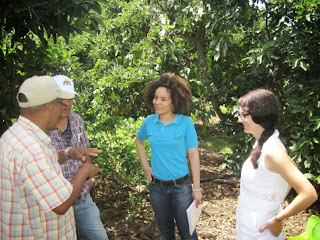F2F Focus on “Tecnicos” in the Dominican Republic Key to Improvements in Farm & Greenhouse Management
 |
| Claire (far right) with F2F field officer Mabel Barinas and producers |
Producers affiliated with the Farmer-to-Farmer (F2F) program
in the Dominican Republic (DR) have shown impressive improvements in the past
five years, according to a recent trip report by Claire Clugston, an
experienced development practitioner in the DR.
Claire has been affiliated with the F2F program for over a year, initially
as a graduate intern in the Washington, D.C. office and later as a volunteer with
the University of Wisconsin helping with monitoring and evaluation efforts in
the DR – the same country where she served as a Peace Corps Volunteer (PCV) for
three and a half years. Because of Claire’s
Spanish language skills and familiarity with development work in the DR, she
was able to get a true grasp on how F2F’s approach there has contributed
towards sustainable agricultural development.
During Claire’s volunteer visit this past August, she made several important observations regarding the positive
impact F2F has had in the country. As a
PCV, she understands the difficulties of doing sustainable development work in
a place where project beneficiaries have become accustomed to receiving
handouts rather than long-term investments in technical training and capacity
building. With F2F, however, Claire was
impressed by the program’s focus on training agricultural extension workers (known
as “tecnicos”) and institutions so that they, in turn, are able to disseminate new
information to hundreds of farmers in neighboring communities.
 |
| Claire (center left) with women's group in San Jose de Ocoa |
Through data collection and analysis of
recommendations adopted by host organizations, Claire noticed the vast
improvements producers made in farm and greenhouse management as a result of
the technical assistance they received from host organizations. Among those improvements was the widespread adoption
of integrated pest management – a pest control strategy that has improved
production using fewer pesticides and has allowed farmers to increase their
incomes and decrease environmental harm.
“A small but well-run establishment”, Claire noted, “will be more
profitable than a large but badly managed farm… Knowledge, rather than
technology or size, is what is most important for producer success.”

.png)

Comments
Post a Comment